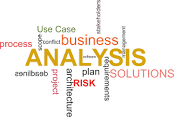Business Analysis – it’s all about business processes
Business Analysis – it’s all about business processes
Learn the essentials of business analysis. Enrol now on BOTI’s business analyst course and understand the concepts of ‘analysis’ and ‘design’. BOTI offers business training courses across South Africa. Book now!
In order to effectively analyse any area of the business, an analyst needs to understand the difference between what is required, that is the ‘analysis’ and how such will be implemented, that is, the ‘design’.
Therefore, it is important to focus on making sure that a business analyst understands exactly how much information to gather in order to apply the most appropriate modelling technique in order to define accurate, complete and concise business requirements that should be used as a basis for developing appropriate business solutions.
Learn the essentials of business analysis. Enrol now on BOTI’s business analyst course and understand the concepts of ‘analysis’ and ‘design’. BOTI offers business training courses across South Africa. Book now!
The essentials of business analysis
Simply explained, business analysis is a research discipline that involves identifying business needs and determining solutions to business problems. Often, solutions include a software-systems development component, yet may also consist of process improvement, orgnisational change or strategic planning and policy development. A business analyst is therefore the individual responsible for carrying out this task.
Learn the essentials of business analysis. Enrol now on BOTI’s business analyst course and understand the concepts of ‘analysis’ and ‘design’. BOTI offers business training courses across South Africa. Book now!
However, a business analyst does not work solely on developing software systems. The general responsibilities of a business analyst involve:
- Investigating business systems and taking a holistic view of the situation. This may include examining elements of the organisational structures and staff development issues as well as current processes and IT systems.
- Evaluating actions to improve the operation of a business system. This may require an examination of organisational structures and staff development needs in order to ensure that they are in line with any proposed process redesign and IT system development.
- Documenting the business requirements for the IT system support using appropriate documentation standards.
In line with this, the core business analyst role could be defined as an internal consultancy role that has the responsibility for investigating business situations, identifying and evaluating options for improving business systems, defining requirements and ensuring the effective use of information systems in meeting the needs of the business.
Learn the essentials of business analysis. Enrol now on BOTI’s business analyst course and understand the concepts of ‘analysis’ and ‘design’. BOTI offers business training courses across South Africa. Book now!
Course overview
The emphasis of this course is on learning to gather, specify and design business processes, so as to avoid creating faster, inefficient processes. Business Process Improvement (BPI), Business Process Re-engineering (BPR) and Business Process Management concepts are discussed and logically debated and practical applications of these disciplines are covered. Systematic, top-down techniques are used to study and decompose a Business Area.
BOTI’s business analyst course and understand the concepts of ‘analysis’ and ‘design’. BOTI offers business training courses across South Africa. Book now!
Course Outcomes
- Understand the background to Business Analysis, Business Process Improvement (BPI) and Business (re) engineering
- Understand the role of the Business Analyst
- Understand the use of various methodologies
- How to start analyzing using a structured approach and know what deliverables are required, that is, process models, process specifications, Entity Relationship Diagrams, entity, relationship and data specifications and the data dictionary.
- Understand which models are the most appropriate to use, flow charts (swimlanes), data flow diagrams (DFD), entity relationship diagrams (ERD), functional decomposition, object orientation (use case), narrative text and so forth.
- How to identify end-to-end business processes from stimulus to response (Organisational Events)
- How to separate design issues from business issues
- How to apply Quality Assurance to each deliverable
- Use a systematic top down approach to process modelling
- Understand what a repository is and why it’s important.
- Identify the characteristics required from a case tool and understand the difference between a modelling tool and a case tool
- Develop a Business Requirements document that can be used as input to design (the Functional Specification)
You will also be introduced to:
- Enterprise analysis (company analysis)
- Creating and maintaining the business architecture
- Conducting feasibility studies
- Identifying new business opportunities
- Scoping and defining new business opportunities
- Preparing the business case
- Conducting the initial risk assessment
- Requirements planning and management
- Requirements elicitation
- Describes techniques for collecting requirements from stakeholders in a project. Techniques for requirements elicitation include:
- Brainstorming
- Document analysis
- Focus groups
- Interface analysis
- Interviews
- Workshops
- Reverse engineering
- Surveys
- User task analysis
- Process mapping
- Observation/job shadowing
- Design thinking
- Requirements analysis and documentation
- Requirements communication
- Solution assessment and validation
Learn the essentials of business analysis. Enrol now on BOTI’s business analyst course and understand the concepts of ‘analysis’ and ‘design’. BOTI offers business training courses across South Africa. Book now!
Delegates are taken through the four possible stages possible of analysis, that is:
- As-Is design
- As-Is analysis,
- New analysis and
- New design.
A variety of tools and techniques are introduced based on a business process engineering methodology. Upon completion of this course the delegate will be in a better position to choose the right tools for the right job.
Learn the essentials of business analysis. Enrol now on BOTI’s business analyst course and understand the concepts of ‘analysis’ and ‘design’. BOTI offers business training courses across South Africa. Book now!
This is a technical business course.
Who Should Attend
Business Analysts, Product Developers or Process Engineers involved with developing business requirements documentation, Product/Service development, Business process improvement (BPI), Business process (re)engineering (BPR) and Business process management (BPM).
Learn the essentials of business analysis. Enrol now on BOTI’s business analyst course and understand the concepts of ‘analysis’ and ‘design’. BOTI offers business training courses across South Africa. Book now!
You might also like: Business Valuation Techniques and Excel Dashboards and Data Visualisation
Sensitivity Analysis in Excel (Financial Modelling) and Advanced Excel Formulas



